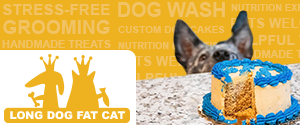- Do you subscribe to Dharma Dog Training’s Newsletter? You should.
- A Unique Campaign from The Humane Society of the United States
- Rabid bats in Omaha- Stay safe, prepared with these tips
- Springtime Activities in Omaha
- Mill Dog Monthly from Bailing Out Benji
- World Spay Day, Legislative Alert in Nebraska
- Attend the Nebraska Rescue Council’s monthly meeting this Saturday
- Five Hard-to-Ignore Reasons to Adopt!
- Paws in Pink to Benefit Breast Cancer Foundation
- VCA, Inc. Acquires MidWest Vet Specialists from Kansas State University
FDA: Should Dog Owners Really Stop Feeding Foods With Peas And Legumes

Grain-free foods are one of the most popular types of dog foods, but they were recently warned by the US Food and Drug Administration. In July 2018, The Food and Drug Administration reported highly unusual cases of dilated cardiomyopathy in canines. The disease occurred on dog breeds such as golden retrievers, labradors, miniature schnauzers, whippets, a Shih Tzu, and a bulldog. This was surprising because these dog breeds are not genetically susceptible to the disease. These dogs had been eating pet foods that contain legumes, mostly peas. Before the research, dilated cardiomyopathy was thought only to be prevalent in dog specific breeds, including the great Dane, boxer, and the Doberman pinscher.
Peas are a great source of vitamins in humans, but they do more harm than good in dogs. Peas belong to the legume family and legumes are known to contain high amounts of phytic acid. Phytic acid can trigger calcium, magnesium, iron, and lectin proteins to bind in a dog’s tissues. Lectin proteins are more of a concern in dogs because they cannot really digest them. They instead bind to lectin receptors, which control the conversion of carbohydrates to glucose. When they bind to these receptors, they interfere with their functions and this can lead to cardiovascular diseases, majorly dilated cardiomyopathy.
Dilated cardiomyopathy is a disease or condition in which the heart enlarges up to a point that it cannot beat or contract effectively. Canines that develop this disease can suffer a sudden death if they don’t receive treatment soon enough.
Dog foods that contain peas affect different dogs in different ways. This is a progressive disease, but some dogs may be affected and start to show symptoms way sooner than others when they are fed foods containing peas. They can develop congestive heart failure a few months after regular meals containing peas. The congestive heart failure will be manifested through quick and heavy breathing, excessive drooling, and a change of color of the tongue (bluish tongue). Some dogs may even just suddenly collapse even before they start showing the other symptoms. If you see any of these signs in your dog, you should take them to a vet immediately and bring along the food it ate.
For some dogs, it may take time before they start showing any symptoms even after being fed foods containing legumes for several years. This is especially true for bigger dogs. These dogs develop also develop a progressive type of dilated cardiomyopathy and one of the first signs will include extreme tiredness and weight loss. The affected dogs can also develop a cough and shortness of breath is also common. Other symptoms that may be developed from dog foods that contain peas include pale gums, frequent loss of consciousness, loss of appetite, increased heart rate, and fluid accumulation in the chest cavity or abdomen. Fluid accumulation in these areas is mainly due to ineffective heart beats making the blood to return to the right side of the heart from the body.
If you are looking for a food without peas and legumes for your dog, you should consider taking some advice from this article. It contains the overall best dog food without peas, legumes, lentils, and even potatoes. Pet foods that are made with potatoes as the main ingredient may have the same effect to a dog as with peas and legumes. Raw potatoes are a no for dogs because they contain a compound known as solanine which is very toxic to dogs. Potatoes, both sweet and regular, are also being strongly warned against by the FDA.
Many people do not know the impact of peas related diet to a dog. If your dog has been eating grain free dog foods that contain peas, legumes, or any other suspect ingredient mentioned in this article, it does not mean your dog is going to die or automatically develop cardiomyopathy. Your dog is only going to be affected if you give too much of this diet. In fact, peas can be quite nutritious if the diet is given in moderation. Giving your dog an occasional snack that contains peas can be a healthy low-calorie alternative. However, if you have been feeding your dog solely foods that contain peas and legumes, you should switch to a food that contains grains or is at least pea free as soon as possible. And you should buy the food from a reputable company that receives the services of a veterinary nutritionist to inspect and evaluate the food. The pet food company should also be conducting canine nutritional research and regularly be publishing peer-reviewed studies. Do not take the health of your canine friend for granted.
Latest News
-
3 Tips for Pet Owners on Training Rescue Dogs
Owning a rescue dog can take some work compared to...
- Posted 1 week ago
- 0
-
Choosing the Right Pet for Your Lifestyle
Are you thinking about getting a pet but unsure what...
- Posted 3 weeks ago
- 0
-
How to Make Your Rescue Pet as Comfortable as Possible
Did you bring home a new pet from a shelter...
- Posted 2 months ago
- 0
-
How Having A Pet Can Change Your Life
Having a pet can open your heart in ways that...
- Posted 7 months ago
- 0
-
How To Improve The Life Of Your Senior Pet
Do you have an elderly fur baby and want to...
- Posted 7 months ago
- 0
-
Springtime Activities To Enjoy With Your Furry Friends
Are you preparing for warmer weather and want some ideas...
- Posted 8 months ago
- 0
-
Pros And Cons Of Microchipping Your Pets
Have you considered whether your pets should be microchipped and...
- Posted 9 months ago
- 0


















You must be logged in to post a comment Login